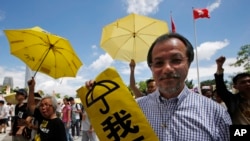Debate on universal suffrage in Hong Kong started Wednesday in a legislative session focusing on the proposed plan's electoral reform.
Thousands of demonstrators for and against the proposed change gathered outside of city government offices. For many the debate is also over the city’s economic and political future.
The vote expected this week is the culmination of months of protests by more than 100,000 demonstrators who pressed for Hong Kong to have an open election for the city’s top leader, the chief executive.
Beijing instead offered a plan that allowed for voters to choose only among those candidates approved by a panel of Beijing loyalists. If lawmakers vote the proposed plan down, the chief executive will continue to be selected by a 1200-member, largely pro-Beijing committee.
Legislators are expected to vote on the reform plan by Friday and current indications are that it lacks the votes needed to pass.
Regina Ip, a member of the city's cabinet and chairwoman of the conservative and Beijing-friendly New People's Party, supports the plan.
“I think this is a good plan because it means a substantial increase of franchise for the Hong Kong people. From 1200 eligible to vote for chief executive to five million eligible voters, that is a big step forward in franchise,” said Ip.
For the plan’s opponents, the key issue is determining who is eligible to run for the office. They say the reforms do little to open up the field to candidates who have different political viewpoints from those favored by Beijing.
Despite those claims, Ip maintains her party is not against democracy and believes the proposed law will strengthen Hong Kong.
“There are other pieces of democratic infrastructure which need to be built, but if the future chief executive is to be elected by several million people, he or she is bound to be more responsive, more accountable, and the popular mandates will help strengthen governance. Hong Kong is in dire need of restructuring our economy and solving many pressing social problems,” said Ip.
Some 27 legislators remain opposed, and the plan needs four legislators to switch sides to obtain the two-thirds of the legislature necessary for the plan to pass.
In preparation for this week’s debate and vote authorities have closed some roads leading to government offices and deployed 5,000 police.




